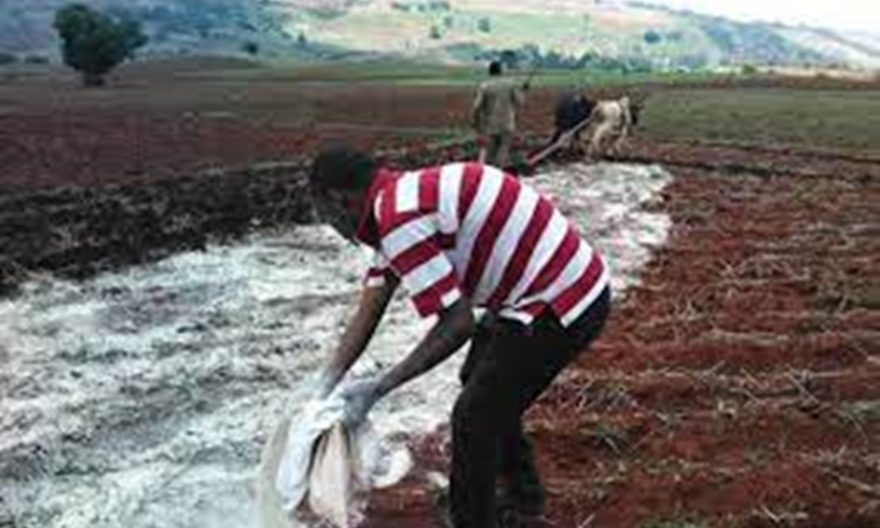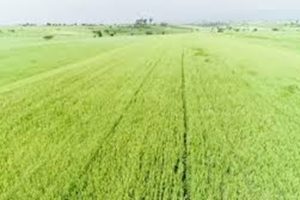
One of the problems that threaten Ethiopia’s agricultural production and productivity is soil acidity. According to data, about seven million hectares or 43% of the country’s arable land is currently affected by soil acidity. Of this, three million hectares are considered to be highly acidic. Agricultural experts indicate that this problem has been neglected until recently, causing a significant negative impact on productivity.
Data also indicate that if only seven million hectares of this acidified land were treated with lime, production and productivity could be increased by fifty percent. They also mention that using lime alone; productivity could be increased from 10 quintals per hectare to 40 to 50 quintals.
National agricultural reform programs are being implemented to ensure that agriculture contributes positively to economic growth beyond food self-sufficiency. Among these are cluster farming, summer wheat, urban agriculture, etc.
Another issue that has received attention is increasing the productivity of acid-affected land by treating with lime; it has been observed that land that has been considered unproductive is bearing yield and remarkable changes have been recorded.
One of the areas where increasing the productivity of acid-affected land by treating with lime is the West Shewa Zone of Oromia Regional State. During this year’s harvest season, productivity of barley crop sown on 853 hectares of land treated with lime in the Tesse Baranda village of Haro Boki Kebele, Wolmera Woreda in the West Shewa Zone; has shown more than double growth.
During a recent field visit by a team led by the regional speaker, Sa’ada Abdurahman, the zone administrator, Dida Gudeta, said that one of the areas in the Oromia region where soil acidity is prevalent is the West Shewa zone. In this year’s harvest season, 108,886 hectares of land which was affected by acidity and have not been able to produce the desired yield for a long time was planted with various crops.
According to the zone administrator, following the regional government’s initiative to treat acidic soil with lime, a lime factory was built in the zone for this purpose. Accordingly, it has been possible to treat soil acidity with lime and increase productivity.
Dida further explained that productivity of the zone could be increased by planting various crops on more than 40,000 hectares of land affected by acidity via treating by lime during the 2024 harvest season. Encouraging results are being achieved by treating the acidity of the soil with lime, he added.
Deputy Administrator of Wolmera Woreda and Head of Agriculture and Land Sector, Desalegn Teshome, on his part, said that this year’s harvest season was successfully completed by treating acid-affected land with lime in collaboration with the Holeta Agricultural Research Center and with the support of the Oromia Agricultural Bureau and the zone.
Desalegn mentioned that 173 farmers organized on 853 hectares of land in cluster farming have treated their farmland with lime and covered it with barley seeds, and the results are encouraging. Recalling that the land had been affected by acidity, which had weakened its ability to produce; Desalegn said that productivity is increasing due to the reforms the government made in the agricultural sector and that local farmers have also been able to achieve results by using the technology of treating their land with lime.
Although acid-affected lands were previously fertilized, their yields were low; however, since the beginning of lime treatment ten years ago, encouraging results have been recorded, Desalegn said.
He also stated that the Guder Lime Factory located near the woreda has made a significant contribution to agricultural productivity in terms of producing the lime needed to treat the land. At least 1,700 sacks/bags/ of lime have been used on 853 hectares of land in the land treatment process.
He said that the results achieved by farmers organizing themselves in clusters and treating their land with lime and using all agricultural packages will encourage them to listen to the advice of experts in the future and strive for better results.
During the barley harvest in Wolmera Woreda, farmers were able to obtain an estimated 70 quintals per hectare by using lime-treated land, using row sowing and using agricultural packages to the full extent.
Dida Gudeta, the zone administrator said that a huge brewery is being built in Ambo town to use the barley produced by farmers as an input for industries. In order to increase the productivity of beer barley produced on lime-treated land, farmers have developed cluster farming practices and have created an opportunity to feed industries using new agricultural technologies.
He added that not only production, but also timely collection of ripe crops and storing them in the barn is another task that makes the agricultural sector effective; 40% of the crops that have ripened have been harvested so far. Although the practice to harvest ripe crops with machines was not common earlier, crops such as barley and wheat are being harvested with machines.
According to Melka Jote, a farmer from Haro Boki Kebele, Wolmera Woreda, West Shewa Zone, 10 years ago, local farmers did not know about acidic soils. Through a program run by the Woreda Agriculture Bureau, agricultural experts have educated local farmers about acidic soils and the conditions under which they can be treated with lime. Based on the training provided, the land is first examined to see if it is affected by acid; after its acidity is confirmed, lime treatment is carried out.
Melka said, “Our land has not been productive since 30 years ago, grain is sown and something called shemama grows, and that too does not grow well,” and adding he mentioned that at that time, the white barley that was sown did not yield more than five to six sacks per hectare. Thanks to the development workers, this year, after consulting with the district agricultural office, they are able to obtain such a product by analyzing the land and using the necessary amount of lime.
“Land gets sick like a person; we do not leave it alone; we give it the necessary treatment and allow it to be productive,” he said.
As to Melka, the barley harvest treated with lime is very exciting compared to the previous years; the farmers should not have to follow their own path as before, but should accept and implement the advice given by the experts in the field. Applying this technology, there is hope of producing teff or other crops every year.
On her part, Speaker of Oromia Regional council, Sa’ada Abdurahman, said that the government is working to increase production and productivity by designing various programs to ensure food security. She announced that agriculture is being transformed from traditional practices to technology-based ones so that it can produce and market products that are not only for food consumption. Efforts are being made to ensure that all agricultural lands are not idle and are being used properly.
Extensive work is being done to utilize all the available potentials to increase productivity. The work implemented in the West Shewa Zone to increase productivity by treating the land with lime and growing summer wheat with groundwater is an example of the steps the government is taking in the agricultural sector. ”There are many opportunities to increase productivity if we work hard; the malt barley productivity seen in Wolmera Woreda is an example of this,” she said.
Recalling that malt barley, which is an input for beer factories, used to be imported; Sa’ada said that the results obtained by treating the acid-affected land with lime and using various technologies show that the country can be self sufficient with the product that can be an input for industries.
She mentioned that the fact that the land which was severely affected by acid and had difficulty producing crops was able to increase productivity beyond expectations has given hope to the farmers; next focus is on the land that was ignored because it could not produce crops and use all the options, which have been seen that productivity can be increased.
As to her explanation, if agricultural experts are committed to standing by the farmers and using the land properly in a manner that respects agro ecology, it will not only ensure food security but also produce marketable products. The acidic land treated with lime is a testament to the fact that if the farmers follow the government’s development guidelines and accept the advice of experts and use them, they will not be victims but will benefit.
In the future, Sa’ada conveyed a message to the farmers to implement the work directions that the government will design to increase productivity with the help of agricultural experts.
BY BACHA ZEWDIE
The Ethiopian Herald December 12/2024





